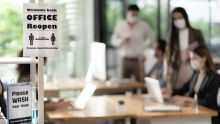Nurturing future-ready accountants

The robots are coming. Indeed, in many cases, they are already here — tech-enabled automation has taken over many manual, routine tasks across industries including accounting, and that will continue to happen at an accelerating rate.
However, accountants will always have a central role to play in business, if they know how to deepen their contributions in areas where automation alone is not a silver bullet for problem solving. That means they have to strengthen their digital acumen, as well as skills like synthesis and analysis, communication, and, above all, adaptability.
How can universities equip accounting professionals with these skills? In an article titled “How to prepare young finance & accounting professionals for digital revolution”, three faculty members from SMU’s School of Accountancy (SOA) – Assistant Professor Clarence Goh, Professor Gary Pan and Senior Lecturer Katherine Yuen – elaborate on how accounting education should be radically transformed in order to future-proof students in this age of automation. These are some highlights.
Embrace active learning
While traditional classroom learning is more about students absorbing information relayed by the teacher, active learning requires students to practise skills, discuss complex questions, propose solutions, and explain ideas in their own words.
This mode of pedagogy is sometimes called experiential learning and project-based learning, and emphasises not just the learning of theory, but also encourages students to apply what they learn in different ways in order to foster mastery and spark reflection.
Very often, that means universities need to collaborate with companies in order to create partnerships where learning can take place for students, universities and companies alike.
Capitalise on the opportunities of digitalisation
Technology can help to unlock a business’ potential, but it takes human ingenuity to use this tool intelligently. For instance, a food manufacturing business commissioned a team of five accounting students from SMU SOA’s Accounting Analytics Capstone course to develop a financial predictive model using data analytics.
The company in question wanted to solve several problems, including making its supply chain more efficient; and obtaining relevant information for assessing overseas expansion.
Using data analytics, the SMU team was able to determine that the company’s historical sales figures revealed distinct periods with spikes in consumer demand. Anticipating such future spikes meant its supply chain could be managed more efficiently.
Using predictive analytics, the team was also able to calculate the likelihood of success when a new product was launched in a new market, and suggest a few countries that had market potential for the specific item consumption.
Gain real-world exposure
Nothing drives home the point that uncertainty is an unavoidable part of business more than exposure to the problems and constraints of the real world. That can also create valuable learning moments, which explains the existence of SMU-X, the experiential learning framework which gives students opportunities to collaborate with corporations, non-profits and government organisations.
In 2018, as part of a SMU-X overseas student consulting programme, a group of 29 undergraduate accounting students from SMU worked with a prominent Laotian conglomerate to examine how data analytics could be used to help the company make better strategic business decisions.
The students were able to work with large amounts of the company’s accounting data, and built sophisticated management dashboards and valuation models for several of its business units. In this endeavour, the students were supported by SMU faculty and company executives, who served as their mentors. The conglomerate also allocated significant resources from various departments, to ensure that the students’ projects were practical and sustainable.
The experience was beneficial on many levels. It allowed the SMU students to apply multidisciplinary skillsets, and build up competencies such as business acumen and data interrogation. In turn, the company’s senior managers found the dashboard and valuation models developed by students to be relevant and useful.
Such projects also offer companies the opportunity to tap on new ideas and views from students, and help universities to adapt their curricula to meet pressing industry needs. With such collaborations between industry and universities expected to grow in the coming years, tomorrow’s accounting professionals will have plenty of real-world experience under their belt by the time they formally enter this rapidly changing industry.


